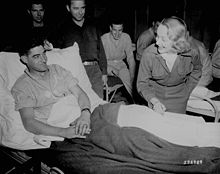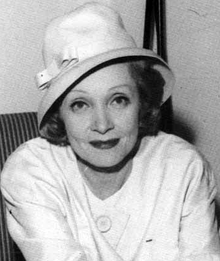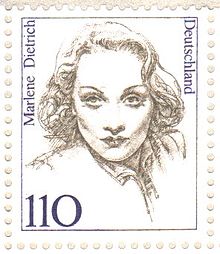- Marlene Dietrich
-
Marlene Dietrich 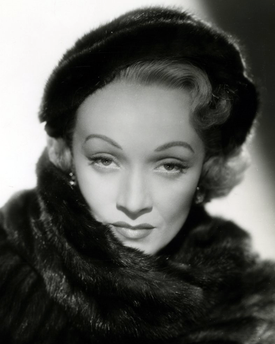
Dietrich in 1951.Born Marie Magdalene Dietrich
27 December 1901
Schöneberg, German EmpireDied 6 May 1992 (aged 90)
Paris, FranceOccupation Actress/Singer Years active 1919–84 Spouse Rudolf Sieber (1923–76) Children Maria Riva, born 13 December 1924 [1] Relatives John Michael Riva (grandson), born 28 June 1948 Website http://www.marlene.com/
Marlene Dietrich (German pronunciation: [maɐˈleːnə ˈdiːtʁɪç]; 27 December 1901 – 6 May 1992)[2] was a German-born American actress and singer.Dietrich remained popular throughout her long career by continually re-inventing herself, professionally and characteristically. In the Berlin of the 1920s, she acted on the stage and in silent films. Her performance as Lola-Lola in The Blue Angel, directed by Josef von Sternberg, brought her international fame and provided her a contract with Paramount Pictures in the US. Hollywood films such as Shanghai Express and Desire capitalised on her glamour and exotic looks, cementing her stardom and making her one of the highest paid actresses of the era. Dietrich became a US citizen in 1937[3], and throughout World War II she was a high-profile frontline entertainer. Although she still made occasional films in the post-war years, Dietrich spent most of the 1950s to the 1970s touring the world as a successful show performer.
In 1999, the American Film Institute named Dietrich the ninth greatest female star of all time.
Contents
Childhood
Dietrich was born Marie Magdalene Dietrich on 27 December 1901 in Schöneberg, a district of Berlin, Germany. She was the younger of two daughters (her sister Elisabeth being a year older) of Louis Erich Otto Dietrich and Wilhelmina Elisabeth Josephine Felsing, who married in December 1898. Dietrich's mother was from a well-to-do Berlin family who owned a clockmaking firm and her father was a police lieutenant. Her father died in 1911.[4] His best friend, Eduard von Losch, an aristocrat first lieutenant in the Grenadiers courted Wilhelmina and eventually married her in 1916, but he died soon after as a result of injuries sustained during World War I.[5] Eduard von Losch never officially adopted the Dietrich children, hence Dietrich's surname was never von Losch, as is sometimes claimed. She was nicknamed "Lena" and "Lene" (pronounced Lay-neh) within the family. Around the age of 11, she contracted her two first names to form the then-novel name of "Marlene".
Dietrich attended the Auguste-Viktoria girls school from 1907 - 1917[6] and graduated from the Viktoria-Suisen-Schule the following year.[7] She studied the violin[8] and became interested in theatre and poetry as a teenager. Her dreams of becoming a concert violinist were cut short when she injured her wrist,[9] but by 1922 she was employed as a violinist in a pit band accompanying silent films at a cinema in Berlin — her first job, from which she was fired after only four weeks.[10]
Early career
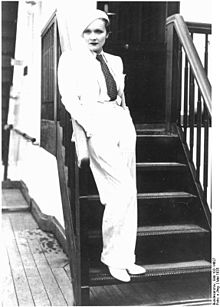 Even at the start of her film career, Dietrich would often combine masculine clothes to her wardrobe, giving herself an androgynous quality[11]
Even at the start of her film career, Dietrich would often combine masculine clothes to her wardrobe, giving herself an androgynous quality[11]
Her earliest professional stage appearances were as a chorus girl on tour with Guido Thielscher's Girl-Kabarett, vaudeville-style entertainments, and in Rudolf Nelson revues in Berlin.[12] In 1922, Dietrich auditioned unsuccessfully for theatrical director and impresario Max Reinhardt's drama academy;[13] however, she soon found herself working in his theaters as a chorus girl and playing small roles in dramas, without attracting any special attention at first. She made her film debut playing a bit part in the 1922 film, So sind die Männer.[14]
She met her future husband, Rudolf Sieber, on the set of another film made that year, Tragödie der Liebe. Dietrich and Sieber were married in a civil ceremony in Berlin on 17 May 1923[15] Her only child, daughter Maria Elisabeth Sieber, was born on 13 December 1924.[16]
Dietrich continued to work on stage and in film both in Berlin and Vienna throughout the 1920s. On stage, she had roles of varying importance in Frank Wedekind's Pandora's Box,[17] William Shakespeare's The Taming of the Shrew[17] and A Midsummer Night's Dream[18] as well as George Bernard Shaw's Back to Methuselah[19] and Misalliance.[20] It was in musicals and revues, such as Broadway, Es Liegt in der Luft and Zwei Krawatten, however, that she attracted the most attention. By the late 1920s, Dietrich was also playing sizable parts on screen, including Café Elektric (1927), Ich küsse Ihre Hand, Madame (1928) and Das Schiff der verlorenen Menschen (1929).[citation needed]
Film star
Breakthrough in The Blue Angel
In 1929, Dietrich landed the breakthrough role of Lola-Lola, a cabaret singer who causes the downfall of a hitherto respected schoolmaster, in UFA's production, The Blue Angel (1930). The film was directed by Josef von Sternberg, who thereafter took credit for having "discovered" Dietrich. The film is also noteworthy for having introduced Dietrich's signature song "Falling in Love Again", which Dietrich recorded for Electrola. She made further recordings in the 1930s for Polydor and Decca.
Paramount Pictures
On the strength of The Blue Angel's international success, and with encouragement and promotion from von Sternberg, who was already established in Hollywood, Dietrich then moved to the U.S. on contract to Paramount Pictures. The studio sought to market Dietrich as a German answer to MGM's Swedish sensation, Greta Garbo.
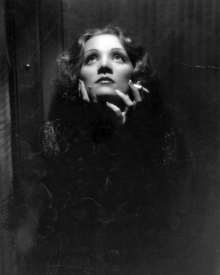 A still from Shanghai Express (1932). Josef von Sternberg used butterfly lighting to enhance Dietrich's features.
A still from Shanghai Express (1932). Josef von Sternberg used butterfly lighting to enhance Dietrich's features.
Dietrich starred in six films directed by von Sternberg at Paramount between 1930 and 1935: von Sternberg worked very effectively with Dietrich to create the image of a glamorous femme fatale. He encouraged her to lose weight and coached her intensively as an actress – she, in turn, was willing to trust him and follow his sometimes imperious direction in a way that a number of other performers resisted.[21]
Their first American collaboration, Morocco, again cast her as a cabaret singer; the film is best remembered for the sequence in which she performs a song dressed in a man's white tie and kisses another woman, both provocative for the era. The film earned Dietrich her only Oscar nomination.
Morocco was followed by Dishonored (with Dietrich as a Mata Hari-like spy) and Blonde Venus. Shanghai Express was von Sternberg and Dietrich's biggest box office hit. Their last two films, The Scarlet Empress and The Devil is a Woman — the most stylized of their collaborations — were their least commercial ventures. Dietrich later remarked that she was at her most beautiful in The Devil is a Woman.
A crucial part of the overall effect was created by von Sternberg's exceptional skill in lighting and photographing Dietrich to optimum effect — the use of light and shadow, including the impact of light passed through a veil or slatted blinds (as for example in Shanghai Express) — which, when combined with scrupulous attention to all aspects of set design and costumes, make this series of films among the most visually stylish in cinema history.[22] Critics still vigorously debate how much of the credit belonged to von Sternberg and how much to Dietrich, but most would agree that neither consistently reached such heights again after Paramount fired von Sternberg and the two ceased working together.[23]
Dietrich's first film after the end of her partnership with von Sternberg was Frank Borzage's Desire (1936), a commercial success that gave Dietrich an opportunity to try her hand at romantic comedy. Her next project, I Loved a Soldier (1936) ended in a shambles when the film was scrapped several weeks into production due to script problems and disagreements between the star and her director.
Box Office Poison
Extravagant offers lured Dietrich away from Paramount to make The Garden of Allah (1936) for independant producer David O'Selznick (she received $200,000) and to England for Alexander Korda's production, Knight Without Armour (1937) (at a salary of $450,000). Although she was now one of the best paid film stars, her vehicles were costly to produce and neither of the latter two films were financially successful. By this time, Dietrich ranked 126th at the box office and exhibitors labelled her "Box Office Poison" (alongside others like Fred Astaire and Katharine Hepburn).
While she was in London, officials of the Nazi party approached Dietrich and offered her lucrative contracts, should she agree to return to Germany as a foremost film star in the Third Reich. She refused their offers and applied for US citizenship in 1937.
She returned to Paramount to make another romantic comedy, Angel (directed by Ernst Lubitsch): reception to the film was so lukewarm that Paramount bought out the remainder of Dietrich's contract. When film projects at other studios fell through, Dietrich and her family set sail for an extended holiday in Europe.
Comeback in Destry Rides Again
In 1939, she accepted producer Joe Pasternak's offer (and a pay cut) to play against type in her first film in two years: that of the cowboy saloon girl, Frenchie, in the light-hearted western Destry Rides Again, opposite James Stewart. The bawdy role revived her career and The Boys in the Back Room, a song she introduced in the film, became a hit when she recorded it for Decca. She played similar types in Seven Sinners (1940) and The Spoilers (1942), both opposite John Wayne.
While Dietrich arguably never fully regained her former screen glory, she continued performing in the movies, including appearances for such distinguished directors as Billy Wilder, Fritz Lang, Alfred Hitchcock and Orson Welles, in films that included A Foreign Affair, Witness for the Prosecution, Rancho Notorious, Stage Fright and Touch of Evil.
World War II
Dietrich was known to have strong political convictions and the mind to speak them. In interviews, Dietrich stated that she had been approached by representatives of the Nazi Party to return to Germany, but had turned them down flat. Dietrich, a staunch anti-Nazi, became an American citizen in 1939.[2][24]
In December 1941, the U.S. entered World War II, and Dietrich became one of the first celebrities to raise war bonds. She toured the US from January 1942 to September 1943 (appearing before 250 000 troops on the Pacific Coast leg of her tour alone) and it is said that she sold more war bonds than any other star.[25]
During two extended tours for the USO in 1944 and 1945,[25] she performed for Allied troops on the front lines in Algeria, Italy, England and France and went into Germany with Generals James M. Gavin and George S. Patton. When asked why she had done this, in spite of the obvious danger of being within a few kilometres of German lines, she replied, "aus Anstand" — "out of decency".
Her revue, with future TV pioneer Danny Thomas as her opening act, included songs from her films, performances on her musical saw (a skill she had originally acquired for stage appearances in Berlin in the 1920s), and a pretend "mindreading" act. Dietrich would inform the audience that she could read minds, and ask them to concentrate hard on thinking about whatever came into their minds. Then she would walk over to a soldier and earnestly tell him, "Oh, think of something else. I can't possibly talk about that!" American church papers reportedly published stories complaining about this part of Dietrich's act.[25]
In 1944, the Morale Operations Branch of the Office of Strategic Services (OSS) initiated the Musac project,[26] musical propaganda broadcasts designed to demoralize enemy soldiers. Dietrich, the only performer who was made aware that her recordings would be for OSS use, recorded a number of songs in German for the project, including Lili Marleen, a favourite of soldiers on both sides of the conflict.[27] William Joseph Donovan, head of the OSS, wrote to Dietrich, "I am personally deeply grateful for your generosity in making these recordings for us.[28]
At war's end in Europe, Dietrich reunited with her sister Elisabeth and her sister's husband and son. The family had resided in the German city of Belsen throughout the war years running a movie theatre for Nazi officers and officials who oversaw the Bergen-Belsen concentration camp. Dietrich interceded with Allied officials on their behalf, sheltering them from possible prosecution as Nazi collaborators.[29]
Dietrich was awarded the Medal of Freedom by the US in 1947. She said that this was her proudest accomplishment.[26] She was also awarded the Légion d'honneur by the French government as recognition for her wartime work.
Stage and cabaret
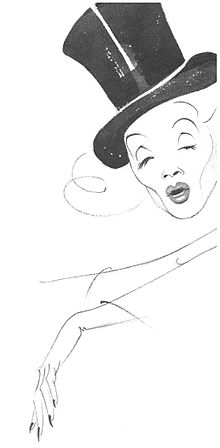 Dietrich often performed parts of her show in top hat and tails. Caricature by Hans Georg Pfannmüller showing Dietrich during a cabaret performance in 1954.
Dietrich often performed parts of her show in top hat and tails. Caricature by Hans Georg Pfannmüller showing Dietrich during a cabaret performance in 1954.
From the early 1950s until the mid-1970s, Dietrich worked almost exclusively as a highly-paid cabaret artist, performing live in large theaters in major cities worldwide.
In 1953, Dietrich was offered a then-substantial $30,000 per week[30] to appear live at the Sahara Hotel[31] on the Las Vegas Strip. The show was short, consisting only of a few songs associated with her.[31] Her daringly sheer "nude dress" — a heavily beaded evening gown of silk soufflé, which gave the illusion of transparency — designed by Jean Louis, attracted a lot of publicity.[31] This engagement was so successful that she was signed to appear at the Café de Paris in London the following year, and her Las Vegas contracts were also renewed.[32]
Dietrich employed Burt Bacharach as her musical arranger starting in the mid-1950s; together they refined her nightclub act into a more ambitious theatrical one-woman show with an expanded repertoire.[33] Her repertoire included songs from her films as well as popular songs of the day. Bacharach's arrangements helped to disguise Dietrich's limited vocal range – she was a contralto[34] – and allowed her to perform her songs to maximum dramatic effect;[33] together, they recorded four albums and several singles between 1957 and 1964.[35]
She would often perform the first part of her show in one of her body-hugging dresses and a swansdown coat, and change to top hat and tails for the second half of the performance.[36] This allowed her to sing songs usually associated with male singers, like "One For My Baby" and "I've Grown Accustomed to Her Face".[33]
"She ... transcends her material," according to Peter Bogdanovich. "Whether it's a flighty old tune like 'I Can't Give You Anything But Love, Baby' ... a schmaltzy German love song, 'Das Lied Ist Aus' or a French one 'La Vie en Rose', she lends each an air of the aristocrat, yet she never patronises ... A folk song, 'Go 'Way From My Window' has never been sung with such passion, and in her hands 'Where Have All the Flowers Gone?' is not just another anti-war lament but a tragic accusation against us all."[37]
Francis Wyndham offered a more critical appraisal of the phenomenon of Dietrich in concert. He wrote in 1964: "What she does is neither difficult nor diverting, but the fact that she does it at all fills the onlookers with wonder ... It takes two to make a conjuring trick: the illusionist's sleight of hand and the stooge's desire to be deceived. To these necessary elements (her own technical competence and her audience's sentimentality) Marlene Dietrich adds a third — the mysterious force of her belief in her own magic. Those who find themselves unable to share this belief tend to blame themselves rather than her."[38]
Her use of body-sculpting undergarments, nonsurgical temporary facelifts, expert makeup and wigs,[39] combined with careful stage lighting[32] helped to preserve Dietrich's glamorous image as she grew older.
Marlene Dietrich discusses her film and cabaret career in an interview recorded in Paris, 1959.
Dietrich's return to Germany in 1960 for a concert tour elicited a mixed response. Many Germans felt she had betrayed her homeland by her actions during World War II. During her performances at Berlin's Titania Palast theatre, protesters chanted, "Marlene Go Home!".[40] On the other hand, Dietrich was warmly welcomed by other Germans, including Berlin Mayor Willy Brandt, who was, like Dietrich, an opponent of the Nazis who had lived in exile during their rule.[40] The tour was an artistic triumph, but a financial failure.[40] She also undertook a tour of Israel around the same time, which was well-received; she sang some songs in German during her concerts, including, from 1962, a German version of Pete Seeger's anti-war anthem "Where Have All the Flowers Gone", thus breaking the unofficial taboo against the use of German in Israel.[39] Dietrich in London, a concert album, was recorded during the run of her 1964 engagement at the Queen's Theatre.[41]
She performed on Broadway twice (in 1967 and 1968) and won a special Tony Award in 1968. In November 1972 I Wish You Love, a version of Dietrich's Broadway show, was filmed in London.[42] She was paid $250,000 for her cooperation, but was unhappy with the result. The show was broadcast in the UK on the BBC and in the US on CBS in January 1973.
In her sixties and seventies, Dietrich's health declined: she survived cervical cancer in 1965[43] and suffered from poor circulation in her legs.[39] Dietrich became increasingly dependent on painkillers and alcohol.[39] A stage fall at the Shady Grove Music Fair in Washington DC in 1973 injured her left thigh, necessitating skin grafts to allow the wound to heal.[44] She fractured her right leg in August 1974.[45] "Do you think this is glamorous? That it's a great life and that I do it for my health? Well it isn't. Maybe once, but not now," Dietrich told Clive Hirschorn in 1973, explaining that she continued performing only for the money.[46]
Final years
Dietrich's show business career largely ended on 29 September 1975, when she broke her leg during a stage performance in Sydney, Australia. Her husband, Rudolf Sieber, died of cancer on 24 June 1976.
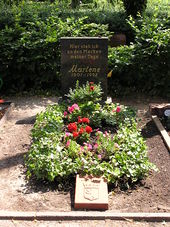 Dietrich's gravestone in Berlin. The inscription reads "Hier steh ich an den Marken meiner Tage" (Here I stand at the mile-stone of my days), a paraphrased line from the sonnet Abschied vom Leben (Farewell from Life) by Theodor Körner.
Dietrich's gravestone in Berlin. The inscription reads "Hier steh ich an den Marken meiner Tage" (Here I stand at the mile-stone of my days), a paraphrased line from the sonnet Abschied vom Leben (Farewell from Life) by Theodor Körner.
Dietrich's final on-camera film appearance was a cameo role in Just a Gigolo (1979), starring David Bowie and directed by David Hemmings. Dietrich also performed the title track in the film, and recorded the song for the soundtrack LP.
An alcoholic and dependent on painkillers, Dietrich withdrew to her apartment at 12 avenue Montaigne in Paris. She spent the final 11 years of her life mostly bedridden, allowing only a select few—including family and employees—to enter the apartment. During this time, she was a prolific letter-writer and phone-caller. Her autobiography, Nehmt nur mein Leben, was published in 1979.
In 1982, Dietrich agreed to participate in a documentary film about her life, Marlene (1984), but refused to be filmed. The film's director, Maximilian Schell, was only allowed to record her voice. He used his interviews with her as the basis for the film, set to a collage of film clips from her career. The final film won several European film prizes and received an Academy Award nomination for Best Documentary in 1984. Newsweek named it "a unique film, perhaps the most fascinating and affecting documentary ever made about a great movie star".[47]
In 1988, Dietrich recorded spoken introductions to songs for a nostalgia album by Udo Lindenberg.[48]
She began a close friendship with the biographer David Bret, one of the few people allowed inside her Paris apartment. Bret is thought to have been the last person outside her family that Dietrich spoke to, two days before her death: "I have called to say that I love you, and now I may die." She was in constant contact with her daughter, who came to Paris regularly to check on her.
In an interview with the German magazine Der Spiegel in November 2005, Dietrich's daughter and grandson claim that Dietrich was politically active during these years.[49] She kept in contact with world leaders by telephone, including Ronald Reagan and Mikhail Gorbachev, running up a monthly bill of over US$3,000. In 1989, her appeal to save the Babelsberg studios from closure was broadcast on BBC Radio, and she spoke on television via telephone on the occasion of the fall of the Berlin Wall in 1990.
Dietrich died of renal failure on 6 May 1992 at the age of 90 in Paris. A service was conducted at La Madeleine in Paris before 3,500 mourners and a crowd of well-wishers outside. Her body, covered with an American flag, was then returned to Berlin, where she was interred at the Städtischer Friedhof III, Berlin-Schöneberg, Stubenrauchstraße 43–45, in Friedenau Cemetery, near her mother's grave and not far away from the house where she was born.
Private life
Unlike her professional celebrity, which was carefully crafted and maintained, Dietrich's personal life was kept out of public view. Dietrich, who was bisexual, enjoyed the thriving gay scene of the time and drag balls of 1920s Berlin.[50]
She married only once, assistant director Rudolf Sieber, who later became an assistant director at Paramount Pictures in France, responsible for foreign language dubbing. Dietrich's only child, Maria Elisabeth Sieber, was born in Berlin on 13 December 1924. She would later become an actress, primarily working in television, known as Maria Riva. When Maria gave birth to a son in 1948, Dietrich was dubbed "the world's most glamorous grandmother". After Dietrich's death, Riva published a frank biography of her mother, titled Marlene Dietrich (1990).
Throughout her career Dietrich had an unending string of affairs, some short-lived, some lasting decades; they often overlapped and were almost all known to her husband, to whom she was in the habit of passing the love letters of her men, sometimes with biting comments.[51] During the filming of Destry Rides Again, Dietrich started a love affair with co-star Jimmy Stewart, which ended after filming. In 1938, Dietrich met and began a relationship with the writer Erich Maria Remarque, and in 1941, the French actor and military hero Jean Gabin. Their relationship ended in the mid-1940s. She also had an affair with the Cuban-American writer Mercedes de Acosta, who was Greta Garbo's lover. Her last great passion, when she was in her 50s, appears to have been for the actor Yul Brynner, but her love life continued well into her 70s. She counted John Wayne, George Bernard Shaw and John F. Kennedy among her conquests.[52] Dietrich maintained her husband and his mistress first in Europe and later on a ranch in the San Fernando Valley, California.
She was raised a Protestant but lost her faith due to battlefront experiences during her time with the US Army as an entertainer after hearing preachers from both sides invoking God as their support. "I lost my faith during the war and can't believe they are all up there, flying around or sitting at tables, all those I've lost."[53] She once said: “If God exists, he needs to review his plan.”[54]
Image and legacy
Dietrich was a fashion icon to the top designers as well as a screen icon that later stars would follow. She once said, "I dress for myself. Not for the image, not for the public, not for the fashion, not for men." Her public image and some of her movies included strong sexual undertones, including bisexuality.
A significant volume of academic literature, especially since 1975, analyzes Dietrich's image, as created by the movie industry, within various theoretical frameworks, including that of psycho-analysis. Emphasis is placed, inter alia, on the "fetishistic" manipulation of the female image.[55]
In 1992, a plaque was unveiled at Leberstraße 65 in Berlin-Schöneberg, the site of Dietrich's birth. A postage stamp bearing Dietrich's portrait was issued in Germany on 14 August 1997.
Luxury pen manufacturer MontBlanc produced a limited edition 'Marlene Dietrich' pen to commemorate Dietrich's life. It is platinum-plated and has an encrusted deep blue sapphire.
For some Germans, she remained a controversial figure for having sided with Nazi Germany's foes during the Second World War. In 1996, after some debate, it was decided not to name a street after Dietrich in Berlin-Schöneberg, her birthplace.[56] However, on 8 November 1997, the central Marlene-Dietrich-Platz was unveiled in Berlin to honor Dietrich. The commemoration reads Berliner Weltstar des Films und des Chansons. Einsatz für Freiheit und Demokratie, für Berlin und Deutschland ("Berlin world star of film and song. Dedication to freedom and democracy, to Berlin and Germany").
Dietrich was made an honorary citizen of Berlin on 16 May 2002.
The U.S. Government awarded Marlene Dietrich the Medal of Freedom for her war work. Dietrich has been quoted as saying this was the honor of which she was most proud in her life. She was also made a chevalier (later commandeur) of the Légion d'honneur by the French government.
In 2000 a German biopic film Marlene was made directed by Joseph Vilsmaier and starring Katja Flint as Dietrich.
Estate
On 24 October 1993, the largest portion of Dietrich's estate was sold to the Stiftung Deutsche Kinemathek—after U.S. institutions showed no interest—where it became the core of the exhibition at the Filmmuseum Berlin. The collection includes: over 3,000 textile items from the 1920s through the 1990s, including film and stage costumes as well as over a thousand items from Dietrich's personal wardrobe; 15,000 photographs, by Cecil Beaton, Horst P. Horst, George Hurrell, Lord Snowdon and Edward Steichen; 300,000 pages of documents, including correspondence with Burt Bacharach, Yul Brynner, Maurice Chevalier, Noël Coward, Jean Gabin, Ernest Hemingway, Karl Lagerfeld, Nancy and Ronald Reagan, Erich Maria Remarque, Josef von Sternberg, Orson Welles, and Billy Wilder; as well as other items like film posters and sound recordings.[57]
The contents of Dietrich's Manhattan apartment, along with other personal effects such as jewelry and items of clothing, were sold by public auction by Sotheby's (Los Angeles) on 1 November 1997.[58] The apartment itself (located at 993 Park Avenue) was sold for $615,000 in 1998.[59]
Works
Filmography
Discography
Radio
Notable appearances include:
- Lux Radio Theater: The Legionnaire and the Lady opposite Clark Gable (1 August 1936)
- Lux Radio Theater: Desire opposite Herbert Marshall (22 July 1937)
- Lux Radio Theater: song of Songs opposite Douglas Fairbanks, Jr (20 December 1937)
- The Chase and Sanborn Program with Edgar Bergen and Don Ameche (2 June 1938)
- Lux Radio Theater: Manpower opposite Edward G Robinson and George Raft (15 March 1942)
- The Gulf Screen Guild Theater: Pittsburgh opposite John Wayne (12 April 1943)
- Theatre Guild on the Air: Grand Hotel opposite Ray Milland (24 March 1948)
- Studio One: Arabesque (29 June 1948)
- Theatre Guild on the Air: The Letter opposite Walter Pidgeon (3 October 1948)
- Ford Radio Theater: Madame Bovary opposite Claude Rains (8 October 1948)
- Screen Director's Playhouse: A Foreign Affair opposite Rosalind Russell and John Lund (5 March 1949)
- MGM Theatre of the Air: Anna Karenina (9 December 1949)
- MGM Theatre of the Air: Camille (6 June 1950)
- Lux Radio Theater: No Highway in the Sky opposite James stewart (21 April 1952)
- Screen Director's Playhouse: A Foreign Affair opposite Lucille Ball and John Lund (1 March 1951)
- The Big Show starring Tallullah Bankhead (2 October 1951)
- The Child, with Godfrey Kenton, radio play produced by Richard Imison for the BBC on 18 August 1965
- Dietrich's appeal to save the Babelsburg studios was broadcast on BBC radio
Dietrich made several appearances on Armed Forces Radio Services shows like The Army Hour and Command Performance during the war years. In 1952, she had her own series on American ABC entitled, Cafe Istanbul. During 1953–54, she starred in 38 episodes of Time for Love on CBS. She recorded 94 short inserts, "Dietrich Talks on Love and Life", for NBC's Monitor in 1958. Dietrich gave many radio interviews worldwide on her concert tours. In 1960, her show at the Tuschinski in Amsterdam was broadcast live on Dutch radio. Her 1962 appearance at the Olympia in Paris was also broadcast.
Writing
- Dietrich, Marlene (1989). Marlene. Salvator Attanasio (translator). Grove Press. ISBN 0-802-11117-3.
- Dietrich, Marlene (1962). Marlene Dietrich's ABC. Doubleday.
- Dietrich, Marlene (1990). Some Facts About Myself. Helnwein, Gottfried [Conception and photographs]. ISBN 3-89322-226-X.
Notes
- ^ N.B. This date requires further review: some sources quote 1925.
- ^ a b Flint, Peter B. (1992-05-07). "Marlene Dietrich, 90, Symbol of Glamour, Dies". The New York Times. http://query.nytimes.com/gst/fullpage.html?res=9E0CE6D7163CF934A35756C0A964958260&sec=&spon=&pagewanted=all.
- ^ http://www.marlene.com/bio.html. N.B. This date requires further review: some sources quote 1939.
- ^ N.B. This date requires further review: some sources quote 1907.
- ^ Born as Maria Magdalena, not Marie Magdalene, as per Dietrich's biography by her daughter, Maria Riva entitled Marlene Dietrich, ISBN#0-394-58692-1
- ^ Bach 1992, p. 20.
- ^ Bach 1992, p. 26.
- ^ Bach 1992, p. 32.
- ^ Bach 1992, p. 39.
- ^ Bach 1992, p. 42.
- ^ http://www.stylehop.com/fashion-blog/2009/04/21/fashion-icon-marlene-dietrich/ Stylehop - Fashion Icon: Marlene Dietrich
- ^ Bach 1992, p. 44.
- ^ Bach 1992, p. 49.
- ^ Bach 1992, p. 491.
- ^ http://www.berlin.de/ba-mitte/bezirk/gedenken/marlene_dietrich.html N.B. This date requires further review: some sources quote 1924.
- ^ Bach 1992, p. 65. N.B. This date requires further review: some sources quote 1925.
- ^ a b Bach 1992, p. 480.
- ^ Bach 1992, p. 482.
- ^ Bach 1992, p. 483.
- ^ Bach 1992, p. 488.
- ^ See e.g., David Thomson, A Biographical Dictionary of the Cinema. London, Secker and Warburg, 1975, page 587: "He was not an easy man to be directed by. Many actors — notably [Emil] Jannings and William Powell — reacted violently to him. Dietrich adored him, and trusted him...."
- ^ See, for example, David Thomson, A Biographical Dictionary of the Cinema. London, Secker and Warburg, 1975, entry for Dietrich: "With him [von Sternberg] Dietrich made seven masterpieces [i.e., Blue Angel in Germany and the six in Hollywood], films that are still breathtakingly modern, which have no superior for their sense of artificiality suffused with emotion and which visually combine decadence and austerity, tenderness and cruelty, gaiety and despair."
- ^ See, for example, the entries for Dietrich and von Sternberg in David Thomson, A Biographical Dictionary of the Cinema (1975).
- ^ N.B. This date requires further review: some sources quote 1937.
- ^ a b c Sudendorf, Werner. "Thanks Soldier", marlenedietrich.org, 2000. Retrieved on 2010-02-20
- ^ a b CIA.gov (2008-10-23). "A Look Back ... Marlene Dietrich: Singing For A Cause". https://www.cia.gov/news-information/featured-story-archive/2008-featured-story-archive/marlene-dietrich.html. Retrieved 2010-03-20.
- ^ McIntosh, Elizabeth P. (1998). Sisterhood of spies: the women of the OSS, p. 58. Dell., London. ISBN 0440234662.
- ^ McIntosh, Elizabeth P. (1998). Sisterhood of spies: the women of the OSS , p. 59; London; Dell. ISBN 0440234662.
- ^ "Marlene Dietrich: Her Own Song," documentary, TCM, 2001
- ^ Bach 1992, p. 369.
- ^ a b c Bach 1992, p. 368.
- ^ a b Bach 1992, p. 371.
- ^ a b c Bach 1992, p. 395.
- ^ Carpenter, Cassie. "Cassie’s Corner: Marlene Dietrich’s Top 10 Badass One-Liners". L.A Slush. http://laslush.com/2011/08/09/739/.
- ^ O'Connor, Patrick (1991). The Amazing Blonde Woman: Dietrich's Own Style. London: Bloomsbury. p. 154. ISBN 0-7475-1264-7.
- ^ Bach 1992, p. 394.
- ^ Morley 1978, p. 69.
- ^ O'Connor, 1991. p. 133.
- ^ a b c d Bach 1992, p. 406.
- ^ a b c Bach 1992, p. 401.
- ^ Bach, 1992. p. 526.
- ^ "I Wish You Love Production Schedule". Marlene Dietrich Collection Berlin. http://www.marlenedietrich.org/noteIwish.htm. Retrieved 2008-10-11.
- ^ Bach 1992, p. 416.
- ^ Bach 1992, p. 436.
- ^ Bach 1992, p. 437.
- ^ Morley 1978, p. 72.
- ^ "Marlene". Atlas International. http://www.atlasfilm.com/00000198640aab305/03227898d60a6720a/03227899d50c45007.htm. Retrieved 2009-01-26.[dead link]
- ^ Bach, 1992. p 528.
- ^ Der Himmel war grün, wenn sie es sagte, Der Spiegel, 13 November 2005. (German)
- ^ Bourke, Amy (May 29, 2007). "Bisexual side of Dietrich show". Pink News. http://www.pinknews.co.uk/news/articles/2005-4512.html.
- ^ Riva, p. 344
- ^ Riva, passim
- ^ Marlene Dietrich: Life & Legend, Steven Bach, Univ Of Minnesota Press, February 16, 2011.
- ^ "Dead Atheists Society". Michaelnugent.com. 2010-09-15. http://www.michaelnugent.com/resources/famous-atheists/dead-atheists-society. Retrieved 2010-09-27.
- ^ Weber, Caroline (September/October/November 2007). "Academy Award: A new volume analyzes Dietrich in and out of the seminar room". Bookforum. http://www.bookforum.com/inprint/014_03/855.
- ^ The German-Hollywood Connection: Dietrich's Street[dead link]
- ^ "Marlene Dietrich: Berlin". http://www.marlene.com/berlin.html. Retrieved 2007-05-18.
- ^ "Dietrich fans scramble to pick up actress's treasures". BBC News. 1997-11-02. http://news.bbc.co.uk/1/hi/world/18931.stm. Retrieved 2007-05-18.
- ^ Swanson, Carl (1998-04-05). "Recent Transactions in the Real Estate Market". The New York Observer. http://www.observer.com/node/40377.
References
- Bach, Steven (1992). Marlene Dietrich: Life and Legend. Doubleday. ISBN 0-385-42553-8.
- Morley, Sheridan (1978). Marlene Dietrich. Sphere Books. ISBN 0-722-16163-8.
- Riva, Maria (1994). Marlene Dietrich. Ballantine Books. ISBN 0-345-38645-0.
- Riva, David J. (2006). A Woman at War: Marlene Dietrich Remembered. Wayne State University Press. ISBN 0-8143-3249-8.
- Spoto, Donald (1992). Blue Angel: The Life of Marlene Dietrich. William Morrow and Company, Inc.. ISBN 0-688-07119-8.
External links
- Official website
- Marlene Dietrich at the Internet Broadway Database
- Marlene Dietrich at the Internet Movie Database
- Marlene Dietrich at AllRovi
- Marlene Dietrich at the TCM Movie Database
- Marlene Dietrich at Find a Grave
- Marlene Dietrich Collection, Berlin (MDCB)
- Marlene Dietrich – Daily Telegraph obituary
- WWII: Marlene Dietrich and the Boys - slideshow by Life magazine
AFI's 100 Years...100 Stars Male Legends Humphrey Bogart • Cary Grant • James Stewart • Marlon Brando • Fred Astaire • Henry Fonda • Clark Gable • James Cagney • Spencer Tracy • Charlie Chaplin • Gary Cooper • Gregory Peck • John Wayne • Laurence Olivier • Gene Kelly • Orson Welles • Kirk Douglas • James Dean • Burt Lancaster • The Marx Brothers • Buster Keaton • Sidney Poitier • Robert Mitchum • Edward G. Robinson • William Holden
Female Legends Katharine Hepburn • Bette Davis • Audrey Hepburn • Ingrid Bergman • Greta Garbo • Marilyn Monroe • Elizabeth Taylor • Judy Garland • Marlene Dietrich • Joan Crawford • Barbara Stanwyck • Claudette Colbert • Grace Kelly • Ginger Rogers • Mae West • Vivien Leigh • Lillian Gish • Shirley Temple • Rita Hayworth • Lauren Bacall • Sophia Loren • Jean Harlow • Carole Lombard • Mary Pickford • Ava Gardner
AFI 100 Years... Categories:- 1901 births
- 1992 deaths
- People from Berlin
- American female singers
- American film actors
- American radio actors
- American television actors
- Bisexual actors
- Cabaret singers
- Deaths from renal failure
- Disease-related deaths in France
- English-language singers
- American people of German descent
- German expatriates in the United States
- German female singers
- German film actors
- Former Calvinists
- German emigrants to the United States
- German silent film actors
- German stage actors
- German-language singers
- LGBT people from the United States
- Liberty Records artists
- Naturalized citizens of the United States
- Tony Award winners
- Torch singers
- Women in World War II
- LGBT musicians from Germany
- Recipients of the Medal of Freedom
- German autobiographers
- Commandeurs of the Légion d'honneur
- American people of Prussian descent
Wikimedia Foundation. 2010.

